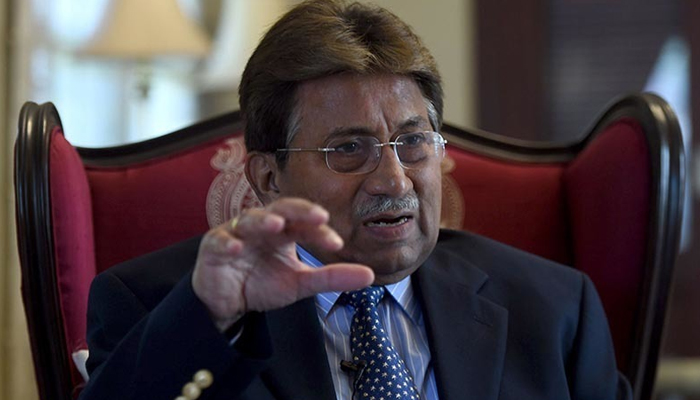Defending the constitution
Supreme Court restored death sentence given to late president General (r) Pervez Musharraf by a special court
On Wednesday, the Supreme Court restored the death sentence given to late president General (r) Pervez Musharraf by a special court. On December 17, 2019, a special court had awarded the death sentence to the former military dictator under Article 6 of the constitution after a case of high treason was filed against him during the PML-N tenure for his unconstitutional decision to impose an emergency in November 2007. Then in January 2022, the Lahore High Court had declared the verdict given by the special court formed to hear the high treason case under Article 6 “unconstitutional”. The LHC verdict was challenged by the Pakistan Bar Council and several senior lawyers. However, now – in 2024 – a four-member SC bench headed by Chief Justice Qazi Faez Isa has upheld the decision taken by the special court. The top court announced the reserved verdict on the appeal filed by the former ruler against the death sentence which was handed to him and declared it ineffective for non-compliance.
While Musharraf died last year in February, the verdict is extremely important in the context of Pakistan which has survived for years under military rulers. For almost half of Pakistan’s existence after its independence from the British, the country has been ruled by military dictators: the list of military usurpers of power includes General Ayub Khan, General Ziaul Haq and General Musharraf. In this context, it is good to see that finally justice has been served and a military dictator’s emergency has been categorically declared unconstitutional in a high treason case. In our checkered history, high treason has usually been used against politicians and progressive activists as a tool to punish them but those who really deserved to be tried for their unconstitutional actions were always protected. Wednesday’s verdict has reversed that and a military dictator has been found guilty of unconstitutional decisions. Even if posthumously, a military dictator has been sentenced for his undemocratic actions and abrogation of the constitution. In a country where there has been no accountability of any military dictator, despite years of struggle against dictatorship, and where politicians and political parties have been taken to task for going after military dictators, where politicians have been imprisoned and even hanged on frivolous charges, it was time we started somewhere. Now that the Musharraf verdict has been upheld, we can finally start to right the wrongs committed in the past. This is why the Musharraf verdict is important. It resets our accountability process, and there is hope that we don’t stop here.
We must not forget that when Mian Nawaz Sharif decided to go after General Musharraf and took legal action against his unconstitutional actions his government ended up facing a 126-day dharna. He was finally sent packing through a judicial verdict. For too many years has Pakistan suffered under managed democracies and straight-up martial law. In the case of the latter, not once did the usurper face justice. The Supreme Court’s verdict is not just a posthumous punishment for abrogation of the constitution but hopefully a hope that real accountability will act as the deterrent it was always meant to be.
-
 Leonardo DiCaprio's Co-star Reflects On His Viral Moment At Golden Globes
Leonardo DiCaprio's Co-star Reflects On His Viral Moment At Golden Globes -
 SpaceX Pivots From Mars Plans To Prioritize 2027 Moon Landing
SpaceX Pivots From Mars Plans To Prioritize 2027 Moon Landing -
 J. Cole Brings Back Old-school CD Sales For 'The Fall-Off' Release
J. Cole Brings Back Old-school CD Sales For 'The Fall-Off' Release -
 King Charles Still Cares About Meghan Markle
King Charles Still Cares About Meghan Markle -
 GTA 6 Built By Hand, Street By Street, Rockstar Confirms Ahead Of Launch
GTA 6 Built By Hand, Street By Street, Rockstar Confirms Ahead Of Launch -
 Funeral Home Owner Sentenced To 40 Years For Selling Corpses, Faking Ashes
Funeral Home Owner Sentenced To 40 Years For Selling Corpses, Faking Ashes -
 Why Is Thor Portrayed Differently In Marvel Movies?
Why Is Thor Portrayed Differently In Marvel Movies? -
 Dutch Seismologist Hints At 'surprise’ Quake In Coming Days
Dutch Seismologist Hints At 'surprise’ Quake In Coming Days -
 Australia’s Liberal-National Coalition Reunites After Brief Split Over Hate Laws
Australia’s Liberal-National Coalition Reunites After Brief Split Over Hate Laws -
 DC Director Gives Hopeful Message As Questions Raised Over 'Blue Beetle's Future
DC Director Gives Hopeful Message As Questions Raised Over 'Blue Beetle's Future -
 King Charles New Plans For Andrew In Norfolk Exposed
King Charles New Plans For Andrew In Norfolk Exposed -
 What You Need To Know About Ischemic Stroke
What You Need To Know About Ischemic Stroke -
 Shocking Reason Behind Type 2 Diabetes Revealed By Scientists
Shocking Reason Behind Type 2 Diabetes Revealed By Scientists -
 SpaceX Cleared For NASA Crew-12 Launch After Falcon 9 Review
SpaceX Cleared For NASA Crew-12 Launch After Falcon 9 Review -
 Meghan Markle Gives Old Hollywood Vibes In New Photos At Glitzy Event
Meghan Markle Gives Old Hollywood Vibes In New Photos At Glitzy Event -
 Simple 'finger Test' Unveils Lung Cancer Diagnosis
Simple 'finger Test' Unveils Lung Cancer Diagnosis




